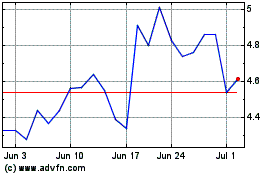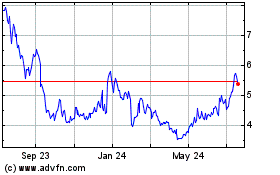Rocket Lab USA, Inc. (Nasdaq: RKLB) (“Rocket Lab” or “the
Company”), a leading launch and space systems company, today
announced the Electron rocket to be launched in the Company’s first
mission from U.S. soil has arrived at Launch Complex 2 in
Virginia.
This press release features multimedia. View
the full release here:
https://www.businesswire.com/news/home/20221012005364/en/
Rocket Lab's Electron launch vehicle
arrives at the Company's Integration and Control Facility in
Virginia ahead of the inaugural mission from Launch Complex 2 at
the Mid-Atlantic Regional Spaceport (Photo: Business Wire)
The mission will deploy satellites for radio frequency
geospatial analytics provider HawkEye 360 and will be Rocket Lab’s
first lift-off from Launch Complex 2 at Virginia Space’s
Mid-Atlantic Regional Spaceport within NASA’s Wallops Flight
Facility – a launch pad developed to support Electron missions from
U.S. soil for government and commercial customers. Encouraged by
NASA’s recent progress in certifying its Autonomous Flight
Termination Unit (NAFTU) software, which is required to enable
Electron launches from Virginia, Rocket Lab has scheduled the
mission from Launch Complex 2 in December 2022.
With Electron now at Launch Complex 2, Rocket Lab will begin
final launch preparations including a standard launch dress
rehearsal and payload integration at Rocket Lab’s dedicated
Integration and Control Facility near the launch site.
Launch Complex 2 supplements Rocket Lab’s existing site, Launch
Complex 1 in New Zealand, from which 31 Electron missions have
already launched. The two launch complexes combined can support
more than 130 launch opportunities every year, delivering unmatched
flexibility for rapid, responsive launch for government and
commercial satellite operators. The launch pad and production
complex for Rocket Lab’s large reusable Neutron launch vehicle will
also be located at the Mid-Atlantic Regional Spaceport,
streamlining operations across small and large launch.
“We are looking forward to seeing Electron take to Virginia
skies for the first time very soon,” said Rocket Lab founder and
CEO Peter Beck. “Rocket Lab has been providing reliable and
responsive access to orbit for more than four and a half years with
Electron and we’re excited to build on that strong heritage by
unlocking a new path to orbit from right here on Virginia’s Eastern
Shore. We are delighted to be working with the dedicated teams at
NASA, Virginia Space, Accomack County and HawkEye 360 to launch
this historic mission and begin a new era of space access.”
The mission will be the first of three Electron launches for
HawkEye 360 in a contract that will see Rocket Lab deliver 15
satellites to low Earth orbit between late 2022 and 2024. These
missions will grow HawkEye 360’s constellation of radio frequency
monitoring satellites, enabling the company to better deliver
precise mapping of radio frequency emissions anywhere in the world.
Supporting Rocket Lab’s vertical integration strategy, Rocket Lab
will also supply HawkEye 360 with separation systems produced by
Planetary Systems Corporation, a Maryland-based space hardware
company acquired by Rocket Lab in December 2021.
Forward Looking Statements.
This press release may contain certain “forward-looking
statements” within the meaning of the Private Securities Litigation
Reform Act of 1995, Section 27A of the Securities Act of 1933, as
amended, and Section 21E of the Securities Exchange Act of 1934, as
amended. All statements, other than statements of historical facts,
contained in this release, including statements regarding our
expectations of financial results for the third quarter of 2022,
strategy, future operations, future financial position, projected
costs, prospects, plans and objectives of management, are
forward-looking statements. Words such as, but not limited to,
“anticipate,” “aim,” “believe,” “contemplate,” “continue,” “could,”
“design,” “estimate,” “expect,” “intend,” “may,” “might,” “plan,”
“possible,” “potential,” “predict,” “project,” “seek,” “should,”
“suggest,” “strategy,” “target,” “will,” “would,” and similar
expressions or phrases, or the negative of those expressions or
phrases, are intended to identify forward-looking statements,
although not all forward-looking statements contain these
identifying words. These forward-looking statements are based on
Rocket Lab’s current expectations and beliefs concerning future
developments and their potential effects. These forward-looking
statements involve a number of risks, uncertainties (many of which
are beyond Rocket Lab’s control), or other assumptions that may
cause actual results or performance to be materially different from
those expressed or implied by these forward-looking statements.
Many factors could cause actual future events to differ materially
from the forward-looking statements in this release, including
risks related to the global COVID-19 pandemic; risks related to
government restrictions and lock-downs in New Zealand and other
countries in which we operate that could delay or suspend our
operations; delays and disruptions in expansion efforts; our
dependence on a limited number of customers; the harsh and
unpredictable environment of space in which our products operate
which could adversely affect our launch vehicle and spacecraft;
increased congestion from the proliferation of low Earth orbit
constellations which could materially increase the risk of
potential collision with space debris or another spacecraft and
limit or impair our launch flexibility and/or access to our own
orbital slots; increased competition in our industry due in part to
rapid technological development and decreasing costs; technological
change in our industry which we may not be able to keep up with or
which may render our services uncompetitive; average selling price
trends; failure of our launch vehicles, spacecraft and components
to operate as intended either due to our error in design in
production or through no fault of our own; launch schedule
disruptions; supply chain disruptions, product delays or failures;
design and engineering flaws; launch failures; natural disasters
and epidemics or pandemics; changes in governmental regulations
including with respect to trade and export restrictions, or in the
status of our regulatory approvals or applications; or other events
that force us to cancel or reschedule launches, including customer
contractual rescheduling and termination rights; risks that
acquisitions may not be completed on the anticipated time frame or
at all or do not achieve the anticipated benefits and results; and
the other risks detailed from time to time in Rocket Lab’s filings
with the Securities and Exchange Commission (the “SEC”), including
under the heading “Risk Factors” in Rocket Lab’s Annual Report on
Form 10-K for the fiscal year ended December 31, 2021, which was
filed with the SEC on March 24, 2022, and elsewhere (including that
the impact of the COVID-19 pandemic may also exacerbate the risks
discussed therein). There can be no assurance that the future
developments affecting Rocket Lab will be those that we have
anticipated. Except as required by law, Rocket Lab is not
undertaking any obligation to update or revise any forward-looking
statements whether as a result of new information, future events or
otherwise.
+ ABOUT Rocket Lab
Founded in 2006, Rocket Lab is an end-to-end space company with
an established track record of mission success. We deliver reliable
launch services, satellite manufacture, spacecraft components, and
on-orbit management solutions that make it faster, easier and more
affordable to access space. Headquartered in Long Beach,
California, Rocket Lab designs and manufactures the Electron small
orbital launch vehicle, the Photon satellite platform and the
Company is developing the large Neutron launch vehicle for
constellation deployment. Since its first orbital launch in January
2018, Rocket Lab’s Electron launch vehicle has become the second
most frequently launched U.S. rocket annually and has delivered 150
satellites to orbit for private and public sector organizations,
enabling operations in national security, scientific research,
space debris mitigation, Earth observation, climate monitoring, and
communications. Rocket Lab’s Photon spacecraft platform has been
selected to support NASA missions to the Moon and Mars, as well as
the first private commercial mission to Venus. Rocket Lab has three
launch pads at two launch sites, including two launch pads at a
private orbital launch site located in New Zealand and a second
launch site in Virginia, USA which is expected to become
operational in 2022. To learn more, visit www.rocketlabusa.com.
View source
version on businesswire.com: https://www.businesswire.com/news/home/20221012005364/en/
+ Rocket Lab Media Contact Morgan Bailey
media@rocketlabusa.com
Rocket Lab USA (NASDAQ:RKLB)
Historical Stock Chart
From Mar 2024 to Apr 2024

Rocket Lab USA (NASDAQ:RKLB)
Historical Stock Chart
From Apr 2023 to Apr 2024
